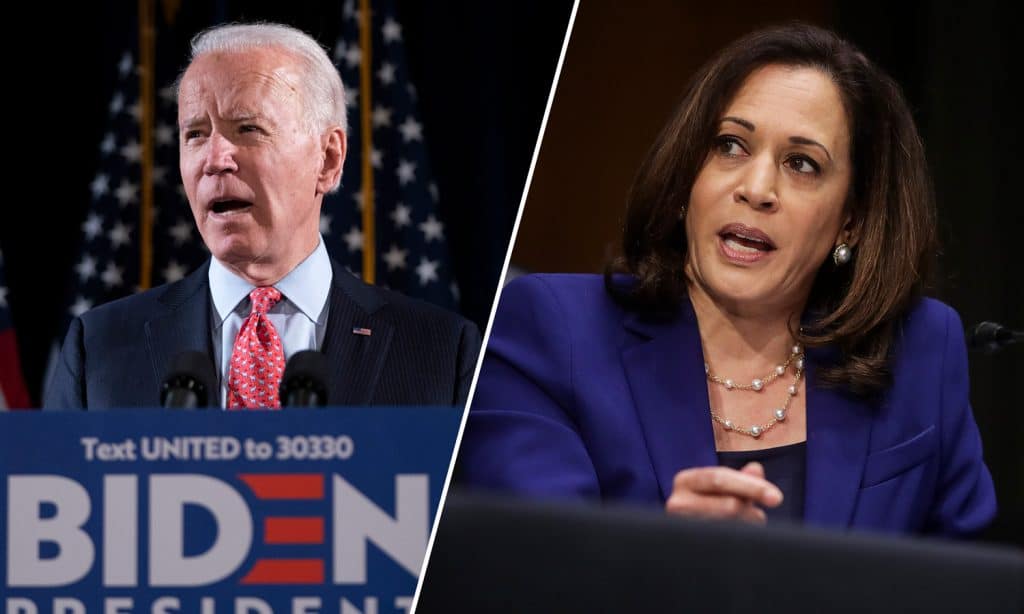It’s clear that this election cycle represents the best chance for the cannabis industry to finally turn the corner with lawmakers.
Assuming current polls about Joe Biden’s lead over Donald Trump holds true, it appears that Biden may just win the election.
Of course, there are plenty of ifs, ands and buts here because, as everyone knows, Trump is throwing every complaint and conspiracy theory into the works in the hopes of convincing fence-sitters to help him get re-elected.
So the outcome is far from certain.
But the cannabis industry is more and more hopeful for a Biden victory as election day gets closer, which also means a Kamala Harris victory. Why that is significant is that Harris sponsored one of the most far-reaching and comprehensive cannabis legalization bills ever seen in Congress, the Marijuana Opportunity Reinvestment and Expungement Act of 2019 (the MORE Act).
RELATED: Kamala Harris Will Help With Cannabis Reform (And That’s Good Enough For Me)
That bill is unlikely to get any serious traction before the end of this year. But it could become a priority by the end of January if Harris takes office—even more so if the Senate becomes a Democratic majority.
And that is just the scenario that the cannabis industry is counting on.
More cannabis-related bills have been introduced into this Congress than ever before—over 90. There have been a few cannabis bills, such as the Secure and Fair Enforcement Banking Act of 2019 (the SAFE Act) that passed out of the House only to be sidelined in the Republican-controlled Senate by Senate gatekeepers like Mike Crapo (R-ID and chair of the Senate Banking Committee), Mitch McConnell (R-KY and Senate Majority Leader) and Lindsay Graham (R-SC chair of the Senate Judiciary Committee).

It’s Graham that has the most control here—cannabis bills have to pass his committee because cannabis is a controlled substance, therefore a Department of Justice issue. The Department of Justice is part of the Judiciary Committee.
RELATED: Is Trump Willing To Lose the Election For Marijuana Prohibition?
As it stands now, two of these senators are not doing well in the polls against challengers, and may possibly lose. Graham, who has held his senate seat since 2003, is reportedly “running for his life” against a suddenly energized opponent and state Democratic Party Chair, Jaime Harrison.
McConnell still maintains a slim lead over his opponent in Kentucky, and is reportedly attempting to distance himself from the Trump administration just in case he needs to energize any undecideds to fight off a late-cycle surge by Democratic contender, Amy McGrath.
It’s clear that this election cycle represents the best chance for the cannabis industry to finally turn the corner with lawmakers, including getting rid of barriers to Congressional progress and ending the single biggest impediment to real sustained progress: getting cannabis totally de-scheduled from the top of the Drug Enforcement Administration’s list of controlled substance, something that the MORE Act proposes.
RELATED: House Democrats Postpone Marijuana Legalization Bill Until After The Election
Standing by watching and waiting are a number of cannabis companies working on initial public offerings (IPOs) who are literally banking on a Biden-Harris win, and who are jazzed by the comment Harris made during the vice-presidential debate about decriminalizing cannabis under her/their administration.

As reported by Reuters, these companies include Flora Growth, that just secured a $30 million funding round and is planning an initial public offering; Gage Cannabis, standing by to do their initial public offering early next year; as well as a startup, biosynthetic maker Biomedican.
Cannabis stocks are surging in recent weeks as well. Aurora Cannabis showed a significant bump the day after the vice president debate, and is up 4% already today. Canopy Growth is up nearly 5% today, riding a wave of highs after the debate. Tilray is up nearly 7%, also trending to higher levels since the debate. Ditto with Cronos Group, up nearly 4% today.
RELATED: Marijuana Decriminalization, Record Expungement Now Top Priority For Biden-Harris
These gains are significant because all of these companies had been trending downward in late summer-early fall. Some—such as Aurora and Tilray—were high flying stocks right after their initial public offerings. Both experienced significant crashes. For example, Tilray traded at $143 per share just two years ago. It now trades at just under $7 a share.
The 2020 election will also feature voters in five states—New Jersey (Question 1) and Arizona (Proposition 207) among them—voting on recreational use of marijuana.
And with cannabis sales rocking across the country, the stage is set for cannabis to finally assume its position as a sure-fire economic engine. Sales in Colorado, for example, have been hitting record highs month after month this year, coming in at $1.4 billion in total sales through August this year and a total of $9.2 billion since legalization in 2014.
Tax revenue from cannabis, a key figure that lawmakers look at, is breaking all expectations. For example, California reported second quarter 2020 tax revenue of $101.8 million.
An even more impressive factoid is the global reach that the cannabis industry has created. Global cannabis sales are expected to reach $19.7 billion by the end of this year, an increase of 38% over 2019, and are forecast to be $47.2 billion by 2025, according to BDS, a cannabis market intelligence company.
RELATED: Don’t Hold Your Breath For Federal Cannabis Legalization
So all the ducks are lined up. If you were a legislator, and wanted to fix the economy from the COVID fallout by legitimizing an industry proven to generate jobs and increase your state’s wealth, maybe now is the opportunity.
This year could become the perfect cannabis-friendly storm: A Democratic administration, Democratic majorities in both the House and Senate, huge cannabis sales and tax revenue figures, and more states legalizing. Will it happen? November 3 will tell all.


